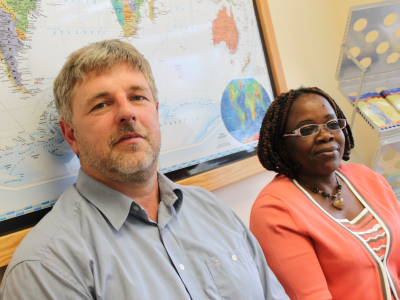To the newcomers who have decided to make Sault Ste. Marie their home, the large world map greeting visitors to Jane Omollo’s office is something familiar in a strange place.
“For every one of us, especially those who were not born and raised here, we came from somewhere,” said Omollo, the co-ordinator for the New to the Sault newcomer settlement program. “And, if you go on the map, there you’ll find it.”
Since 2006, the program, operated out of the Sault Community Career Centre, has helped visitors transition to their new home community by offering settlement support services, including finding employment, meeting new people, learning a new language, signing up for OHIP, or getting involved in local activities.
Clients undergo a needs assessment before an action plan is developed to guide them through settlement. Many clients come to the Sault with an idea of what they want to do, but need help working out the details to make their goals attainable, Omollo said.
“Some of those things look very, very basic, but if you’ve ever left the comfort of the known environment…where you don’t have all these things and you don’t know anybody, that’s when you realize that they’re not basic,” she said. “They mean a lot and you cannot move forward unless you have all these things in place.”
Services offered by the centre include an English conversation session to help newcomers with their language skills, cultural cooking classes, and employer lunches, during which local employers speak to newcomers about the requirements for employment.

Ketan, Payal and Kritika Ughadpaga moved from Toronto to Sault Ste. Marie, where they now own and operate the Trunk Motel.
Charmed by the beauty of the landscape, master carpenter Claus Finkler first came to the Sault in 1984 to enjoy the Great Lakes and the abundance of canoeing opportunities. Before long, he had purchased a business running canoe trips for European clients. Friends and family back home in Germany knew it wouldn’t be long before he settled in Canada for good.
It was 2005 when he wandered into the Sault Community Career Centre looking for settlement information, and not long after he and his wife became the first clients of the New to the Sault program. He immediately felt at ease with Omollo, who had previously lived in Germany and could relate to his experience.
“When you walk in that door and you meet someone where you know right from the beginning that she must have had similar experiences, that just brings you already a little closer to things,” Finkler said.
After attending an employers’ workshop, Finkler landed a job building the new community career office and hasn’t stopped working since. He said the services offered by the centre were integral to helping him ease into his new life.
The transition is still underway for Ketan Ughadpaga, his wife, Payal, and his daughter, Kritika, who moved to the Sault from Toronto in 2010. The family followed Ketan’s brother, who moved to the city seven years ago to work at Essar Steel Algoma.
Originally from India, the family said life in the Sault has been an adjustment from the hustle and bustle of Toronto, but running the Trunk Motel has kept them busy.
“We’re making improvements, so business his better these years than the last couple of years,” Ketan said.
Though she concedes that there are fewer employment opportunities in the Sault than in Toronto, Payal said the city has been a nice place in which to raise a family, especially with the Indian-Canadian community there to support them.
“There are so many programs,” she said. “The community keeps us busy.”
Immigration is not new to Sault Ste. Marie; the city was built by a first wave of largely European immigration, Omollo noted. But now the city’s second wave of immigration is comprised mainly of visible minorities like the Ughadpagas, and the Sault is changing to reflect that demographic.
Over the last three to five years, there has been an increase in the number of newcomer-owned Mac’s convenient stores, and a number of restaurants and home-based catering businesses have opened up, offering Mexican, Japanese or Turkish fare.
The purchase of Essar Steel Algoma and Tenaris Algoma Tubes within the last decade has additionally attracted people from India and South America to the city.
“Depending on where the market is going, that’s how we are seeing the face of Sault Ste. Marie change,” Omollo said. “To me, it’s just the beginning of things.”




